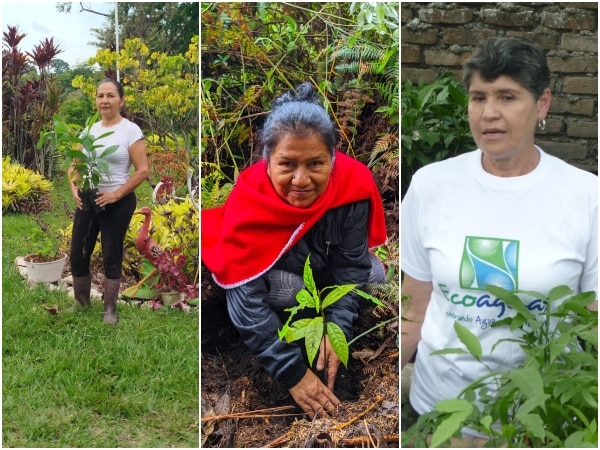With socio-environmental initiatives, women have positively transformed their lives.
News Valley.
October 15 marks the International Day of Rural Women, a date established by the General Assembly of the United Nations in 2007. This day seeks to recognize the invaluable contribution of rural women in agricultural development, the eradication of poverty and improving food security.
In Colombia, these women not only guarantee the food sustenance of their communities, but are also guardians of the environment and biodiversity.
Also read:
Rural women ensure half of the world’s food sustenance and lead crucial reforestation and watershed recovery initiatives. In this context, the program Ecoaguasa Syngenta socio-environmental initiative created in 1995, has empowered numerous women in the departments of Valle del Cauca, Cauca, Urabá Antioquia and Magdalena. This program aims to preserve tropical native forests and promote an environmental culture in communities.
The program “Sowing water”which currently impacts 18 municipalities, works with vulnerable rural populations in strata 1 and 2, mostly led by women. Of the 1,164 linked nurserymen, 60% are women who, through their work, obtain income that improves their quality of life and that of their families.
Achievements of the Ecoaguas program
Since its creation, Ecoaguas has achieved significant results in environmental conservation:
- Production of 1,900,000 native trees of more than 170 protected species.
- Intervention of 4,051 hectares in Antioquia, Cauca, Magdalena and Valle del Cauca.
- Reforestation and protection of 18 micro-watersheds and 372 water sources in the country.
Transformation stories
María Teresa Gamboa: Our Castle Nursery

Photo: supplied
Located in the township of La Unión, in the municipality of Florida, Valle del Cauca, the nursery Our Castle It is a clear example of how perseverance and passion can transform lives. Founded by María Teresa Gamboa, this family nursery has positively impacted not only its economy, but also the environmental environment of the region.
María Teresa’s journey into the world of gardening began on January 11, 2010. During a visit to a friend in the village of El Llanito, she came across the nursery Green Forcewhere he met Mrs. Idali Moreno, leader of the place. “He explained to me the dynamics of the nursery and the importance of taking care of the environment,” María Teresa recalls. Fascinated by the potential this type of venture offered, she decided it was time to do something similar in her community.
The Birth of the Community Nursery
Motivated by her interest and the need to generate income, María Teresa met with two women from her locality, also mothers who are heads of household. Together they formed a group of nine people to create a community nursery on their farm. With the support of Asodesthe Association of Surface and Groundwater Users of the Desbaratado River Basin, obtained approval to start their project.
Shortly thereafter, the technicians EcoaguasSyngenta’s initiative, visited the nursery and saw the group’s potential. Thanks to this connection, they were able to become part of the Ecoaguas family and begin the reforestation and recovery of the Desbaratado River basin.
Today, María Teresa Gamboa leads the Nuestro Castillo nursery, grateful for the support she received along her path. “Thanks to the money I generate, I have been able to pay the bank fees to fix my house, buy gifts for my children and prepare special dinners,” he expresses with emotion.
Gabriela Mestizo: “Fxtu Wesx Nasa” Nursery


In the Triunfo Cristal Páez reservation, in the municipality of Florida, Valle del Cauca, the nursery «Fxtu Wesx Nasa» It has become a symbol of conservation and empowerment for the Los Caleños indigenous community. This project, promoted by Gabriela Mestizo and a group of 24 women, arose in response to the indiscriminate felling of native trees, which has threatened local fauna and flora.
Since its inception in 2007, under the leadership of then-governor José Vicente García, the nursery has received fundamental support from Asofrayle and Ecoaguas. The collaboration of these organizations has allowed not only the development of the enterprise, but also the awareness of the community about the importance of taking care of its environment. With a focus on the production and planting of native trees, the group has increased its initial projection from 500 to 3,000 trees, with ambitious goals for the future.
The economic benefits of this nursery have been significant. The women involved have used their income to improve the education of their children and the living conditions in their homes. “We have invested in housing, food and clothing,” says Mestizo, thanking those who have contributed to the expansion of the project.
Today, the nursery has not only promoted reforestation, but has also led to the return of various animal species to the region. Thanks to conservation efforts, the natural environment has experienced a positive transformation, fostering a harmonious coexistence between the community and its environment. Gabriela Mestizo invites others to join this cause, ensuring that “each tree planted is a step towards a sustainable future.”
Olga Yara de Gallego: San Luis Nursery

Olga Yara de Gallego, originally from Pradera and resident of the town of Potrerito, has found in the San Luis nursery an opportunity to rebuild her life after the uprooting caused by the armed conflict in her region. Previously dedicated to household chores, Olga and her husband, Héctor Gallego, were forced to abandon their farm in La Carbonera and adapt to a new environment. Despite the initial challenges, his life took an unexpected turn when he became involved in activities promoted by Asobolo and Ecoaguas.
The first contact with these organizations occurred thanks to Dr. Amalia Morales, who invited her to learn about the care of seeds and tree species. Although she initially supported her husband in the nursery, her passion for gardening led her to assume full responsibility. With the training she received, Olga learned to manage the process of planting and caring for seedlings, turning her small space into a thriving nursery.
Since 1998, Olga has been a fundamental part of Asobolo and Ecoaguasand over 26 years, he has transformed his nursery into a source of therapy and sustenance. After the loss of her husband, the nursery became her emotional refuge, giving her the opportunity to move forward. “I feel proud to know that I have many ‘children’ of different species planted in the region,” she says with satisfaction.
Today, the San Luis nursery not only represents a means of subsistence for Olga, but also an educational space where she receives students and visitors who want to learn about her experience. Grateful for the support received, Olga continues to contribute to the care of the environment, demonstrating that despite the obstacles, it is possible to find hope and purpose in the love of nature.
You can also read:


















